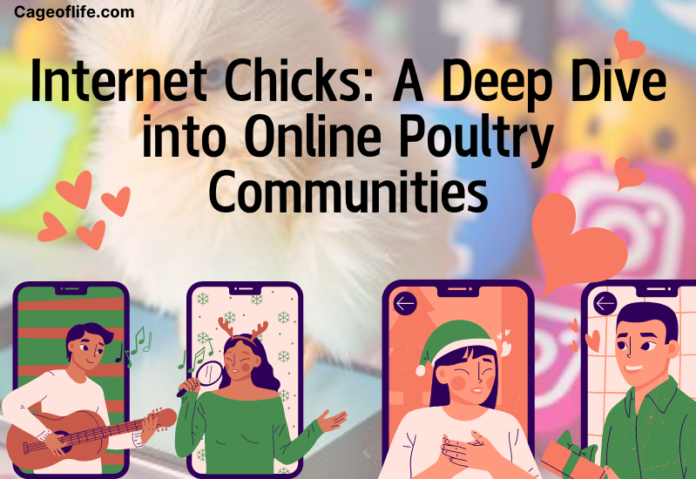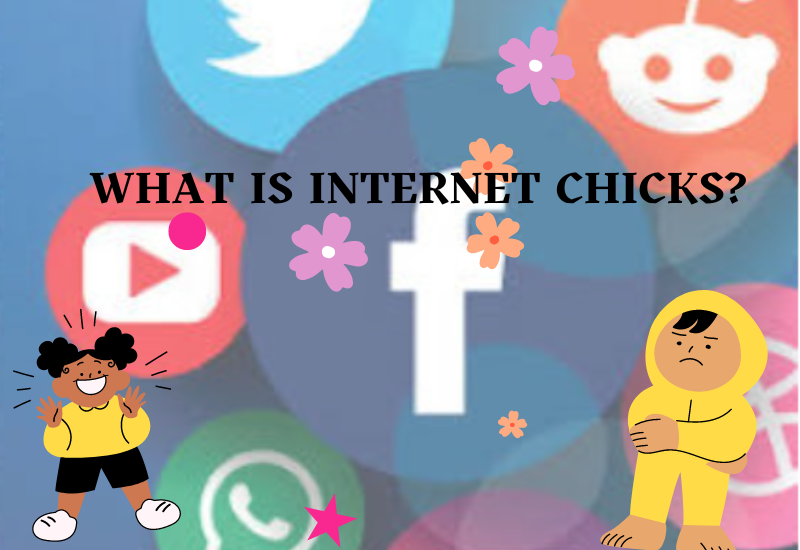
In the vast expanse of the internet, countless niche communities thrive, each dedicated to unique passions and interests. Among these digital gathering places, one particular community stands out, attracting a devoted group of enthusiasts who share a common love for a rather unexpected subject. This article delves into the heart of this online world, where like-minded individuals come together, exchange ideas, and celebrate their shared interest in ways that are both surprising and fascinating. Join us as we explore this vibrant community, uncovering the connections, creativity, and camaraderie that define it, all while keeping its central focus intriguingly under wraps.

What is “Internet Chicks”?
“Internet Chicks” is likely a playful or informal term referring to a community or group of people who are passionate about chickens and poultry, and who share their interests online. This could include forums, social media groups, blogs, or websites where enthusiasts discuss raising chickens, share tips, post pictures, and connect with others who share their interest in poultry.
Internet Chicks: Online Poultry Communities
In recent years, online poultry communities have grown significantly, creating a dynamic digital ecosystem for enthusiasts passionate about raising and caring for poultry. These communities have become essential hubs for exchanging knowledge, offering support, and fostering camaraderie among chicken keepers and poultry aficionados. The rise of these online groups reflects a broader trend towards digital networking and a growing interest in sustainable and backyard farming.
These communities are incredibly diverse, offering a range of resources for members. Forums provide a platform for in-depth discussions and troubleshooting, where individuals can ask questions and share their experiences. Social media groups on platforms like Facebook and Instagram offer real-time updates, tips, and visual inspiration. Meanwhile, blogs and specialized websites provide comprehensive guides, news, and expert advice tailored to both beginners and seasoned poultry keepers. This wide array of resources ensures that every aspect of poultry care is covered, fostering a supportive and informative environment for members worldwide.
Internet Chicks: The Rise of Online Poultry Enthusiasts
The surge in online poultry communities is driven by several interconnected factors that mirror broader societal trends. One key factor is the growing trend of backyard farming. As more people become interested in understanding the origins of their food and the benefits of self-sufficiency, backyard farming has gained popularity. This interest has led many to seek information, support, and community online. Raising chickens for fresh eggs, meat, or as pets has become increasingly common, with individuals turning to the internet for guidance and a sense of community.
The popularity of internet chicks sustainable living has also contributed to this rise. As environmental concerns grow, more people are adopting sustainable living practices, including raising their own poultry. Online communities provide a platform for sharing eco-friendly poultry care methods, discussing sustainable practices, and learning how to reduce one’s carbon footprint through local food production.
Another significant factor is the desire for self-sufficiency. Economic uncertainties and a growing interest in self-reliance have motivated people to explore poultry keeping as a means of becoming more self-sufficient. Online communities serve as valuable resources for tips on raising poultry, managing flocks, and troubleshooting common issues, helping individuals feel more confident in their journey towards self-sufficiency.
Internet Chicks: Diverse Membership Profiles and Motivations
Online poultry communities attract a diverse range of members, each bringing unique perspectives and needs. Understanding this diversity illustrates the richness of these communities and their broad appeal.
The members range from casual hobbyists to serious professionals. Hobbyists typically keep poultry for personal enjoyment, as a way to connect with nature, or to have a fresh supply of eggs. Their engagement with poultry care often revolves around learning and sharing in a relaxed, informal setting. They seek straightforward advice, beginner-friendly resources, and community support to navigate common issues and enhance their poultry-keeping experience.
On the other hand, professionals, such as small-scale farmers or those involved in commercial internet chicks poultry operations, approach poultry keeping with a focus on efficiency, productivity, and advanced care. These members often have specific, technical needs and are interested in detailed advice on breeding, disease management, and optimizing production. They contribute to the community by sharing expert knowledge, best practices, and insights into industry trends.
Urban and rural keepers face different challenges and solutions, which are frequently discussed in these communities. Urban chicken keepers often deal with limited space, zoning regulations, and concerns about noise and odor. They might need to adapt their practices to fit smaller coops and manage their flocks in a way that complies with city ordinances. Innovative solutions such as vertical coops, compact breeds, and odor-control strategies are commonly shared within urban-focused online communities.
In contrast, rural and suburban internet chicks poultry farmers typically have more space and fewer regulatory constraints. Their challenges often include managing larger flocks, dealing with predators, and maintaining large-scale equipment and infrastructure. They engage with the community to discuss issues like pasture rotation, advanced breeding techniques, and efficient feed management. Rural keepers benefit from discussions on scaling up operations and integrating poultry into broader agricultural practices.
The Value of User-Generated Content
User-generated content is essential in online poultry communities, offering significant benefits through visual documentation and interactive formats. Photos and videos allow members to share practical poultry care techniques and experiences, providing valuable insights and inspiration. Visual content such as images of coop designs, feeding setups, and flock interactions helps others visualize effective layouts and potential modifications.
Interactive content, such as live streams and Q&A sessions, significantly enriches the community experience by fostering real-time engagement and support. Internet chicks live streams allow members to broadcast their activities, such as daily routines, health inspections, or troubleshooting sessions, directly to their audience. This format offers immediate access to practical demonstrations and the opportunity for viewers to interact through comments and questions.
Q&A sessions provide members with the chance to ask experts or experienced keepers specific questions and receive detailed answers in real-time. This interaction helps address unique issues, clarify complex topics, and offer tailored advice that might not be available through standard posts or articles. The immediate feedback and personalized responses make Q&A sessions a valuable tool for problem-solving and learning.
Key Online Resources for Poultry Enthusiasts
Online poultry communities offer a wealth of resources designed to support and enhance the experience of poultry enthusiasts. These resources are integral to the vibrant ecosystem of advice and knowledge sharing that defines these digital spaces.
At the heart of internet chicks these communities are forums and discussion boards, which serve as the backbone of interactive knowledge exchange. Here, members engage in detailed conversations, pose questions, and share practical insights. These internet chicks platforms enable users to tap into collective wisdom, where both novices and seasoned poultry keepers contribute their experiences. The real-time nature of forums allows for dynamic discussions on urgent issues, seasonal tips, and evolving best practices in poultry management.
Educational content is another cornerstone of online poultry communities. This includes a wide range of resources such as blogs, articles, and video tutorials, which cater to different levels of expertise. From introductory guides for beginners to advanced techniques for experienced keepers, this content provides actionable advice. Videos and step-by-step articles help demystify complex topics like breeding, disease management, and coop construction, making valuable knowledge accessible to all members.
Product reviews and recommendations also play a crucial role in these internet chicks communities. Enthusiasts rely on these reviews to make informed decisions about equipment, feed, and healthcare products. Members share their firsthand experiences with various products, highlighting what works well and what doesn’t. This peer-driven feedback helps others choose the best tools and supplies for their needs, ensuring that their poultry care practices are supported by high-quality resources.
Together, these resources form a comprehensive support network that empowers poultry enthusiasts. Whether seeking immediate advice, diving into educational materials, or exploring product recommendations, members find that these online communities offer a wealth of information tailored to their specific needs and interests.
Internet Chicks: The Role of Social Media
Social media has fundamentally transformed how poultry enthusiasts connect and share information, creating a dynamic and expansive digital network. Before the rise of social media, poultry keepers relied on local clubs, print resources, and word-of-mouth to exchange knowledge. Today, platforms like Facebook, Instagram, and Reddit have revolutionized this process, enabling enthusiasts to access a global pool of information and connect with others who share their interests.
On Facebook, specialized groups have become vital for fostering community and dialogue. Enthusiasts can join groups tailored to their specific needs, whether they’re looking for advice on chicken health, breeding techniques, or coop design. These groups facilitate real-time conversations, allowing members to post questions, share their experiences, and receive feedback from a diverse range of users. This immediacy and accessibility have made Facebook a central hub for poultry-related discussions.
Instagram has introduced a visually engaging way for poultry enthusiasts to share their experiences. The platform’s emphasis on photos and videos allows users to showcase their flocks, share tips, and display their poultry setups. Hashtags like #BackyardChickens, #ChickenLife, and #PoultryKeeping help users discover and engage with content relevant to their interests. These hashtags create a sense of community and enable users to connect with others who share similar passions.
Influencers in the internet chicks or poultry community play a crucial role in shaping trends and disseminating information. These individuals, often with substantial followings, use their platforms to offer advice, review products, and share personal experiences. Their credibility and reach help to amplify important messages, spread innovative ideas, and build a sense of trust within the community.
User-generated content is a cornerstone of social media’s impact on poultry communities. Photos, videos, and live streams created by members provide a real-time glimpse into various aspects of poultry care. For example, live streams of daily activities, such as feeding routines or coop maintenance, offer practical insights and allow viewers to interact directly with the broadcaster. This immediate feedback loop enhances learning and engagement.
Additionally, shared photos and videos of poultry projects (internet chicks), such as new coop designs or hatching processes, inspire and educate others. These visual contributions help demystify poultry care, making it more accessible to newcomers and experienced keepers alike. The collective knowledge and shared experiences contribute to a rich tapestry of resources that members can draw upon.
Challenges and Controversies
Despite their many benefits, online poultry communities face challenges and controversies. Misinformation is a significant issue, as incorrect advice can lead to poor outcomes in poultry care. Members must navigate varying regional regulations, which can complicate the applicability of shared advice. Additionally, differing opinions on poultry care practices, such as ethical treatment and breed preferences, can create confusion and debate within the community.
Contentious issues such as the ethical treatment of poultry, breed preferences, and the ongoing debate between commercial and backyard farming often divide the community. These factors highlight both the dynamic nature of these communities and the complexities that come with navigating such a diverse and passionate group of poultry enthusiasts.
The Future of Internet Chicks
As online poultry communities continue to grow, they will remain crucial for supporting and educating poultry enthusiasts. Looking ahead, the integration of emerging technologies could further enhance these communities. Virtual reality meetups could provide immersive, interactive experiences, allowing members to tour each other’s coops or attend virtual poultry shows. Artificial intelligence may offer advanced, personalized care advice and diagnostics, further supporting individual flock management.
These innovations promise to enrich the role of online poultry communities in poultry care and education, ensuring that they continue to be valuable resources for enthusiasts worldwide. As these communities evolve, they will likely become even more integral to the global poultry-keeping landscape, fostering a deeper connection between enthusiasts and their flocks.




